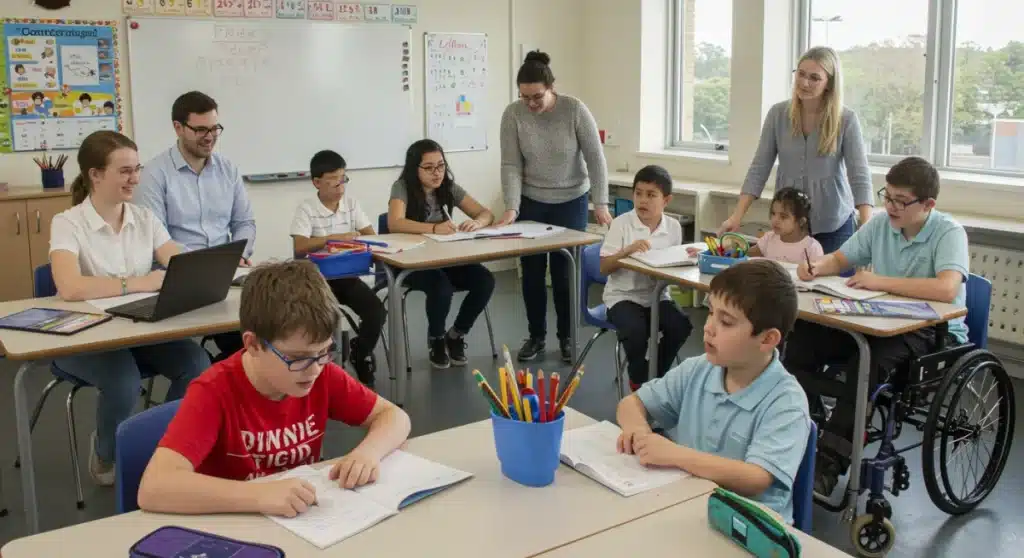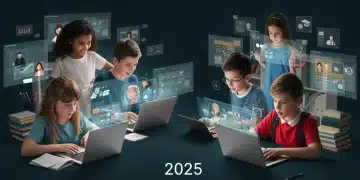Special Education Resources: Rights & Support in 2025 (Insider Knowledge)

Special Education Resources: Understanding Your Rights and Available Support in 2025 (INSIDER KNOWLEDGE) is crucial for parents navigating evolving educational landscapes, ensuring children with disabilities receive appropriate, legally mandated services and accommodations.
As of late 2024, significant developments are shaping the landscape of Special Education Resources: Understanding Your Rights and Available Support in 2025 (INSIDER KNOWLEDGE). Parents and guardians must remain vigilant and informed to ensure children with disabilities receive the comprehensive, legally mandated support they are entitled to. This breaking news report provides timely insights into what to expect in the coming year.
Key Legislative & Policy Shifts for 2025
The year 2025 is poised to introduce several notable legislative and policy shifts impacting special education. These changes, stemming from both federal and state-level discussions, aim to refine existing frameworks such as the Individuals with Disabilities Education Act (IDEA) and Section 504 of the Rehabilitation Act.
Advocacy groups have been actively pushing for greater accountability and more robust funding mechanisms, which could translate into enhanced services. Reports indicate a growing emphasis on early intervention and personalized learning plans, moving beyond traditional models to embrace more adaptive and technology-driven approaches.
Federal Directives & Funding Outlook
Federal agencies are currently reviewing proposals designed to streamline the process for identifying and serving students with disabilities. A key focus is on ensuring equitable access to resources, particularly for underserved communities. The proposed budget for 2025 suggests a potential increase in federal grants for special education programs, though the final allocation remains subject to congressional approval.
- Increased scrutiny on state compliance with IDEA mandates.
- Potential new guidelines for individualized education program (IEP) development.
- Emphasis on mental health support and integration within special education services.
These directives are expected to provide a clearer path for schools to implement best practices and for families to advocate effectively for their children’s needs.
Understanding Your Child’s Rights in the New Landscape
Navigating the complex world of special education rights can be daunting, but understanding the core principles is paramount for parents. In 2025, the fundamental rights enshrined in IDEA, such as the right to a Free Appropriate Public Education (FAPE) and due process, remain steadfast. However, the interpretation and implementation of these rights continue to evolve with new policy developments.
Parents have the right to be active participants in all decisions regarding their child’s education, including evaluation, placement, and the development of their Individualized Education Program (IEP) or 504 Plan. Schools are legally obligated to provide written notice for any proposed changes to a child’s educational program and to obtain parental consent before conducting evaluations.
The Importance of the IEP and 504 Plan
The IEP and 504 Plan are cornerstones of special education support, outlining the specific services, accommodations, and goals for a student with a disability. For 2025, there’s an increased push for these plans to be more dynamic and responsive to a child’s progress and changing needs. This means more frequent reviews and opportunities for adjustments, ensuring the plan remains relevant and effective.
- IEP (Individualized Education Program): Covers students with one or more of the 13 specified disabilities under IDEA, requiring specialized instruction.
- 504 Plan: Provides accommodations for students with disabilities who do not require specialized instruction but need support to access the general education curriculum.
- Parents should meticulously review these documents to ensure they accurately reflect their child’s needs and the agreed-upon services.
Advocates recommend keeping detailed records of all communications with the school and any evaluations or reports related to the child’s special education services.
Available Support Services and Resources for Families
Beyond the classroom, a wealth of support services and resources are available to families of children with special needs. These range from community-based organizations to state-funded programs designed to complement school-based interventions. Identifying and accessing these resources is a critical component of holistic support for the child and the family unit.
Many states offer parent training and information centers (PTIs) that provide free assistance and guidance on special education laws, rights, and advocacy strategies. These centers are invaluable for families seeking to understand their options and navigate the system effectively. Additionally, various non-profit organizations specialize in specific disabilities, offering tailored resources, support groups, and educational materials.
Leveraging Technology for Enhanced Support
Technology is playing an increasingly vital role in expanding access to special education resources. In 2025, expect to see more widespread adoption of assistive technologies, online learning platforms, and telehealth services to support students and families. These tools can provide flexible learning environments, facilitate communication, and offer specialized therapies remotely.
- Online platforms for IEP management and communication between parents and educators.
- Telehealth services for speech, occupational, and physical therapy, increasing accessibility.
- Educational apps and software designed for students with specific learning differences.
Families are encouraged to explore these technological avenues to supplement traditional support systems and enhance their child’s learning experience.

Advocacy Strategies for Parents in 2025
Effective advocacy is a cornerstone of securing appropriate special education services. Parents are their child’s primary advocates, and understanding how to effectively communicate needs and assert rights is crucial. The evolving landscape of 2025 demands informed and proactive engagement with school systems and service providers.
Begin by thoroughly educating yourself on federal and state special education laws. This foundational knowledge empowers you to engage in informed discussions and challenge decisions that may not be in your child’s best interest. Attend all meetings, ask questions, and ensure all agreements are documented in writing.
Building a Collaborative Relationship with the School
While advocacy can sometimes involve dispute resolution, fostering a collaborative relationship with school staff is often the most effective approach. Approach discussions with an open mind, focusing on solutions that benefit your child. Share information about your child’s strengths, challenges, and preferences to help the school tailor their support.
- Maintain open lines of communication with teachers, therapists, and administrators.
- Request regular progress reports and participate in annual IEP/504 plan reviews.
- Consider bringing an advocate or legal representative to meetings if you feel overwhelmed or unheard.
Remember, the goal is to work together to create an educational environment where your child can thrive.
Emerging Trends in Special Education Delivery
The field of special education is not static; it continually adapts to new research, technologies, and societal understandings of disability. In 2025, several emerging trends are shaping how special education services are delivered, promising innovative approaches to learning and support.
One significant trend is the increased focus on inclusive education, aiming to integrate students with disabilities into general education classrooms to the maximum extent possible. This involves providing appropriate supports and modifications within the regular classroom setting, fostering a sense of belonging and promoting peer interaction.
Personalized Learning Pathways and AI Integration
Personalized learning, already a growing trend, is expected to gain further traction in 2025, especially with the integration of artificial intelligence (AI). AI-powered tools can analyze a student’s learning patterns, identify areas of difficulty, and suggest tailored interventions and resources. This allows for highly individualized instruction that adapts to each student’s pace and style.
- AI-driven adaptive learning platforms providing customized content and assessments.
- Virtual reality (VR) and augmented reality (AR) for immersive learning experiences.
- Data analytics to track student progress and inform instructional decisions.
These technological advancements hold the potential to revolutionize how special education is delivered, making learning more engaging and effective for a diverse range of students.
Preparing for Future Challenges and Opportunities
Looking ahead, parents and educators must prepare for both challenges and opportunities within special education. While advancements bring promise, issues such as funding disparities, teacher shortages, and the increasing complexity of student needs will continue to require attention and proactive solutions. Staying informed and engaged will be crucial for navigating these dynamics.
The emphasis on individualized support and early intervention suggests a proactive approach to addressing learning differences. This shift offers an opportunity to identify and support students much sooner, potentially mitigating future academic and social challenges. Community partnerships and interdisciplinary collaboration are also becoming increasingly vital in creating a robust support ecosystem.
The Role of Community and Collaboration
Effective special education extends beyond school walls. Community organizations, healthcare providers, and local government agencies play a significant role in providing comprehensive support. In 2025, expect to see greater emphasis on fostering these collaborations to create a seamless network of resources for families.
- Increased partnerships between schools and local mental health services.
- Community-based programs offering extracurricular activities and vocational training for students with disabilities.
- Parent advocacy networks gaining strength to influence policy at local and state levels.
By working together, all stakeholders can contribute to building a more inclusive and supportive environment for children with special education needs.
| Key Aspect | Brief Description |
|---|---|
| Legislative Shifts 2025 | New federal and state policies refining IDEA and Section 504, focusing on early intervention and personalized learning. |
| Parental Rights | Fundamental rights to FAPE and due process remain, with emphasis on active participation in IEP/504 plan development. |
| Technological Integration | Increased use of assistive tech, online learning, and AI for personalized, accessible education and therapy. |
| Advocacy & Collaboration | Parents must be informed advocates, building collaborative relationships with schools and community partners for comprehensive support. |
Frequently Asked Questions About 2025 Special Education
While IDEA’s core principles remain, 2025 anticipates refined federal and state policies. These changes focus on enhancing early intervention, promoting personalized learning pathways, and potentially increasing funding for special education programs, with a strong emphasis on accountability and equitable access for all students.
Parental rights to a Free Appropriate Public Education (FAPE) and due process remain legally protected. New policies in 2025 are expected to reinforce parental involvement in IEP and 504 Plan development, ensuring families are active participants in all educational decisions and have access to necessary information.
Technology’s role is expanding significantly. In 2025, expect greater integration of assistive technologies, AI-powered personalized learning platforms, and telehealth services. These tools aim to offer more flexible, accessible, and individualized educational experiences, supporting students with diverse learning needs both in and out of the classroom.
Families can access support through various channels. State-specific Parent Training and Information (PTI) centers offer free guidance on special education laws. Additionally, numerous non-profit organizations provide resources, support groups, and specialized information tailored to specific disabilities, complementing school-based services and fostering community.
Effective advocacy in 2025 involves educating oneself on special education laws, maintaining thorough records, and fostering collaborative relationships with school staff. Parents should actively participate in all meetings, ask informed questions, and consider bringing an advocate if needed, ensuring their child’s needs are clearly communicated and met.
What Happens Next
As 2025 unfolds, the implementation of these legislative and policy changes will be closely monitored by advocacy groups and educational authorities. Families should anticipate ongoing communication from their school districts regarding updated procedures and available programs. Further federal guidance documents are expected, providing more granular details on compliance and best practices. Watching for state-level initiatives and local district adaptations will be crucial, as these will directly impact the day-to-day delivery of Special Education Resources: Understanding Your Rights and Available Support in 2025 (INSIDER KNOWLEDGE). The emphasis continues to be on ensuring every child with a disability receives a tailored and effective education, fostering independence and academic success.





